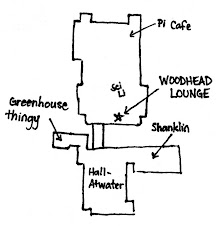However frequently you do laundry (I realize this post may be theoretical for some, but bear with me), there are many ways to do it.
MachinesThe washing machines at Wes are high efficiency machines. All you need is two tablespoons of detergent (that's about to line one of the detergent cap). In general, it's a good idea to do a large load of laundry rather than a small one. Just make sure not to overload the machine or your clothes will stay dirty.
Also, it's best to wash with cold water (whether you're washing whites or colors). If you have a nasty stain (...), you might want to do warm or hot...but for most of your washing cold is good (that's the "Bright Colors" setting on the washers).
In terms of dryers, it's better to use a
drying rack. If you're using the dryer, though, you can take your clothes out early to save energy. The dryers run on 60 minute cycles and you don't need all of that time to dry your stuff.
Detergents and Fabric SoftenersGo for a phosphate-free detergent (phosphates
cause algae blooms in waterways). There isn't really a concensus as to which is better: liquid or powder detergents.
Some say powdered detergents are better for mud and related stains and that liquid is better for oily, food-type stains. I'm more interested in powdered detergent right now (well, as interested as I can be in that type of thing), because powdered detergent doesn't include water and you know, I'm trying not to waste that stuff. Treehugger also
likes powdered detergent.
- Dropps: I haven't tried these yet, but I like the idea. They're little half-ounce packets of detergent that dissolve in the machine. They come in a pouch (not a bottle or a box).
- Ecover: this is what I currently use (detergent and fabric softener). The bottle and cap are both #1 plastic (which means they're recyclable in CT). They're good about disclosing all ingredients, but some are still vague (perfume...um, what kind of perfume?). Hmm. These products are available at the It's Only Natural Market on Main Street (herein referred to as ION).
- Soap Nuts: these are not detergent--they're nuts! Really. Buy some here online or I think I've seen them at ION. Here's a post on GroovyGreen about them. Bonus: you can compost them!
- Oxygen Bleaches: if you're going to bleach things, this is an alternative to chlorine bleach products. This website is extremely informative.
For more, see the
ION website.
Sodium Lauryl SuflateSodium Lauryl Sulfate is a foaming agent present in lots of cleaners. Dangerous or not dangerous? According to
Tom's (the toothpaste company now owned by Colgate) and the
American Cancer Society, the answer is no. It's not cancer-causing, but it
is a skin irritant. Still, there are a bunch of people out there who advocate against it. I think it's pretty hard to find a cleaner without it (it's what makes stuff sudsy). Note that when a product says a cleaning agent is "coconut derived" that probably means it's SLS (because SLS is derived from coconut oil).
Links:
Treehugger's Laundry How-ToIt's Only Natural Market

 (cartoon by Dave Walker)
(cartoon by Dave Walker) (This is my room from freshman year. Though it may not look like it, this is my room in it's cleanest state)
(This is my room from freshman year. Though it may not look like it, this is my room in it's cleanest state) Here's an interview with him on Treehugger.
Here's an interview with him on Treehugger.
